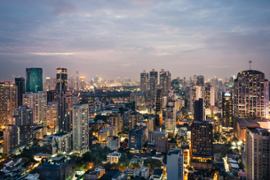The legalization of land-based casinos in Thailand is currently a highly debated issue, especially with physical casinos expected to be introduced under the new government's leadership. However, experienced politicians have raised concerns, cautioning against the potential social problems that such projects could bring.
Thai career politicians sounds alarm over casino proposal
A prominent critic of the proposed casino legalization in Thailand is Abhisit Vejjajiva, a former Thai Prime Minister. He has strongly opposed the idea, warning of social issues as the primary reason to avoid legalizing casinos in the country. In an interview with the Bangkok Post, a well-regarded local news outlet that has been covering this topic extensively, Abhisit described the legalization of land-based casinos as perilous, asserting that they would not deliver significant economic advantages. Instead, he argued, casinos could negatively impact society, potentially leading to petty crime and increased household debt. Abhisit’s concerns are not unfounded, as other regions, like parts of the United States, have experienced a rise in debt associated with sports gambling. However, the link between casinos and crime has not been definitively proven, though fears of increased crime around casino areas persist. Abhisit has also challenged the government's claim that opening physical casinos would generate additional tax revenue, boost tourism, and create new jobs. He stressed that these potential benefits are uncertain and should be carefully considered against the possible negative consequences expanded gambling might bring to Thailand.
Actual impact of casino legalization remains to be seen
The government has stated that opening casinos will enable them to collect revenue from operating licenses and taxes, boost employment, and attract tourists. However, we must carefully weigh the potential benefits against the risks, he emphasized. Abhisit's comments are not expected to have any immediate impact, as the country is almost certainly moving towards legalizing casinos to compete with other regional hubs such as Macau, Japan, South Korea, and Vietnam. Meanwhile, Thailand has been actively working to eliminate illegal gambling, partly due to pressure from China, which raised concerns about recent incidents involving Chinese nationals falling victim to illegal gambling activities in the country.





























